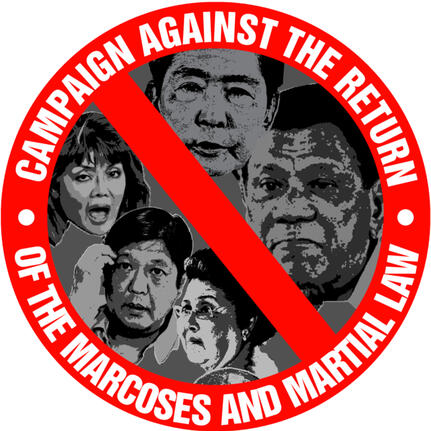
Campaign Against the Return of the Marcoses and Martial Law
Resources
Relevant websites and sources that provide additional information on martial and its continuing impact to the people and the nation.
Bantayog ng mga Bayani in the Filipino language means “Monument to the Heroes.” It is a landscaped memorial center honoring those individuals who lived and died in defiance of the repressive regime that ruled over the Philippines from 1972 to 1986.By displaying authentic material objects associated with the heroes and martyrs, as well as with the period of dictatorship, the Bantayog Museum hopes to awaken in its visitors a powerful sense of history as it was actually made by real-life men and women.Building up the Bantayog Museum’s collections, as well as properly organizing them with a digitized information system, is the focus of work in the short to medium term. At the same time, the work of educating the public about the Bantayog Museum and its chief concerns should be addressed through more special exhibits, lecture series, conferences and such. A very important complementary task is to dig deeper into the sources of information about martial law; an oral history project must be started while participants during the period are still around to remember and to recount.
KARAPATAN is an alliance of individuals, groups and organizations working for the promotion and protection of human rights in the Philippines. Its founders and members have been at the forefront of the human rights struggle in the Philippines since the time of Marcos’ martial law regime.KARAPATAN was founded by its member organizations in 1995 (when the former umbrella organization no longer satisfied the needs of its member organizations and of the people’s organizations it was supposed to serve). Set up to respond to the needs of its member organizations, KARAPATAN has very close linkages with them.
The Human Rights Violations Victims’ Memorial Commission (HRVVMC) was created by Republic Act No. 10368, also known as “An Act Providing for Reparation and Recognition of Victims of Human Rights Violations During the Marcos Regime, Documentation of Said Violations, Appropriating Funds Therefor and For Other Purposes” particularly in Section 27.The Commission’s primary mandate is to establish, restore, preserve and conserve a Memorial Museum, Library, Archive and Compendium in honor of the human rights violation victims (HRVVs) during the Marcos regime who are included in the Roll of Human Rights Violations Victims determined by the Human Rights Victims’ Claims Board (HRVCB). It is also tasked to display the Roll of Victims in government offices and public places and prepare a compendium of their sacrifices.
The Marcos Regime Research (MRR) program is the response of the UP Third World Studies Center (TWSC) to the unabated tide of historical revisionism in favor of the Marcos regime—a re-prioritization of research on the rule of Ferdinand Marcos and the continuing influence of the Marcos family and their cronies in the Philippines. Currently, the program mainly consists of funded and in-house historical research projects conducted by the Center's Marcos Regime Research group. Among the outputs of this program are academic journal articles, conference presentations, and short articles released via online media outlets.
A virtual space serving as a living memorial to a pivotal period in Philippine history, the Digital Museum of Martial Law in the Philippines serves as a platform to provoke critical reflection, inclusive learning, and vigilant remembrance through the multi-faceted lens of artistic expression.The Digital Museum of Martial Law in the Philippines was founded on September 21, 2016 by Dakila – Philippine Collective for Modern Heroism.
The Martial Law Museum aims to be a comprehensive online learning resource that our community of educators can use to teach the values of human rights, freedom, democracy and engaged citizenship to Filipino students through factual and engaging storytelling.Spanning more than 300 references and 100 consultations with experts, our research has produced 25 exhibits on different dimensions of the dictatorship and the lessons we can learn from our history as Filipinos. We have worked with more than 300 teachers from 32 different institutions to test and develop our lesson plans and exhibits. We are developing more.
The Martial Law Chronicles Project is an undertaking by a non-partisan group of individuals against historical revisionism, particularly efforts to recast the late dictator, Ferdinand E. Marcos, as a hero.We believe that Marcos’ despotic rule as President of the Philippines and as Commander in Chief of its Armed Forces, from 1965 to 1986, has led to the loss of life and liberty of thousands, the hunger and poverty of millions, and a culture of fear, tyranny, impunity and injustice that continue to stain the democracy we valiantly fought for and regained in 1986.Negative Historical revisionism thrives under such a culture. So long as this culture taints the light of our democracy, we will stand steadfast against historical negationism. Through education and advocacy, we will continue the legacy of the brave who, even in death, inspires us to demand justice, and to keep the fire of courage burning ever brighter.
The Martial Law Index is an effort of Developh effort at curating & mirroring government papers, documentaries, scholarly papers, and the like from and on the Martial Law era. #NeverForgetWhile drive links, Facebook posts, threads, and the like are being circulated — they oft lack context, curation, and mirrors. Developh wanted to integrate existing libraries/materials and create a replicable website that can also be rehosted and copied.